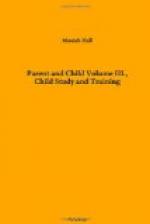Luther Burbank shows that in order even for a plant to grow properly it must have abundance of sunshine, good air, and nourishing food; but not many mothers at this time may have even these poor luxuries. Instead, too many mothers are slaves to an insanitary kitchen where sunshine is scarcely known and where overwork and worry destroy all appetite for food.
The welfare of the race demands that the mother shall be properly nurtured and protected during this critical period. Abundance of sunshine, pure air, light exercise and a variety of wholesome food are absolutely essential, and the utmost pains should be taken to prevent worry, excitement, sickness and above all contact with or exposure to poisons or disease.
It was once thought that whatever causes a mental disturbance in the mother leaves its impress on the child. It is fortunate that this old notion is false, as we have shown nothing but a physical change affecting the blood supply can possibly influence the developing organism. Now and then a red “flame” spot or so-called birthmark is found on the new-born child, but this is due always to some physical cause which may be easily explained, never is it a result of fear of some red object on the part of the mother.
LESSON III
DISCUSSION
1. How does embryonic life begin?
2. What is characteristic of the cell?
3. What secret does it hold?
4. What is the principal need of the embryo?
5. State fully how the blood supply may be vitiated and what terrible consequences may follow.
6. How should the mother be cared for during this critical period?
7. How may mother drudgery in the home be reduced to a minimum?
8. What directions does Mrs. West give for the care of the mother? (See bulletin, “Parental Care,” by Mrs. West, which may be had free for the asking. Address Children’s Bureau, Department of Labor, Washington, D.C.)
9. References: The following books will be found helpful: “The Training of the Human Plant,” by Burbank; “The Right of the Child to be well born,” by Dawson; “Being Well Born,” by Guyer.
If these are available, they may be circulated through the parents’ library.
THE PLASTIC AGE OF CHILDHOOD
Prolonged Infancy and the Long Period of Plasticity in the Infant Make Training and Education Possible
The child is born the weakest and most helpless of creatures. Unlike the young of most animals, which within a few hours after birth move about and perform most of the movements necessary to their existence, the infant is so helpless that all its needs must be supplied by parents, otherwise it would perish. Immediately after birth a colt or calf can walk or run almost as fast as its mother; the chick just out of its shell can run about and peck at its food. The child at one year of age can barely totter around and all of its needs must be looked after by others. Moreover, the infant at birth is practically blind and deaf and the senses of taste and smell and touch just sufficiently developed to enable it to take nourishment.




